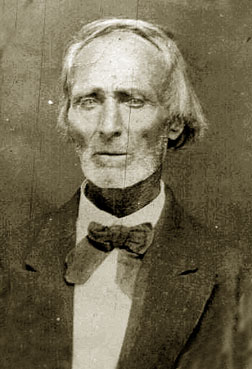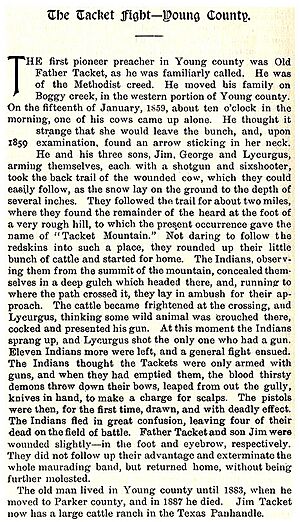Pleasant Tackitt facts for kids
Pleasant Tackitt (born April 22, 1803 – died February 7, 1886) was an important person in the 1800s. He was a Methodist minister, a farmer, a teacher, and even a politician. He also served as an officer in the Confederate States Army during the American Civil War.
Pleasant Tackitt played a big role in the history of Arkansas and North Texas. He was known as "the Fighting Parson" because he bravely fought against Native American groups in Texas.
Contents
Early Life and Ministry
Pleasant Tackitt was born in Henry County, Kentucky. His parents were Lewis Tackitt and Mary Elizabeth Bashum. He was one of seven children in his family.
In 1829, the Missouri Methodist Conference sent Pleasant to Arkansas. His job was to be a missionary to the Western Cherokees. For two years, he traveled around, visiting different places to share his message. After that, he worked in mission schools.
On August 20, 1830, he married Kezia Frances Bruton in Pope County, Arkansas. Before moving to Texas, he served one term in the Arkansas General Assembly, which is like being a state representative. In the autumn of 1853, he joined a group heading to Texas.
Life in Texas
Pleasant Tackitt arrived in Texas in the spring of 1854. This was two years before Parker County was officially set up. He settled near Walnut Creek, close to what is now Springtown, Texas.
He started the Goshen Church and helped clear land for the cemetery next to it. He gave his first sermon in Texas inside the cabin home of Hezekiah Culwell. He regularly held church services in Goshen, Springtown, and Ash Creek, where he helped build churches.
In 1857, he helped organize the First United Methodist Church in Weatherford, Texas. Later, the Texas Methodist Conference sent Pleasant to Fort Belknap, Texas. His mission was to share the gospel with both friendly Native Americans and white settlers.
He started churches in Palo Pinto, Shackelford, and Young Counties. One of these churches was in Graham, Texas. At one point, Tackitt had 143 places to visit for his ministry. This meant he had to travel about 1,200 miles to see everyone!
Tackitt Mountain Skirmish
Tackitt Mountain in Young County was named after him. This was because of a fight that happened there in 1860. The Tackitt family had a skirmish with a group of Native Americans. The group was led by a Comanche chief known to settlers as Piny Chummy.
During the American Civil War, Pleasant Tackitt served in Young County. He was a chief justice, which is like a main judge. He was also the postmaster and helped sign up soldiers for the Confederate States Army.
Challenges on the Frontier
Life on the frontier was often dangerous. One time, a cow from the Tackitt family's farm came home with an arrow in its back. Pleasant and his three oldest sons, James, Lycurgus, and George, took their weapons. They went to find the rest of their cattle.
As they were returning from the Tackitt Mountain area, ten Native American warriors suddenly appeared from a hidden spot. Arrows and bullets flew. Four of the attackers were killed. James was hurt with an arrow point stuck in his head. Pleasant also had an arrow point pierce his foot. Both were in a lot of pain but survived.
Even with these tense moments, all of Pleasant's children lived long lives, mostly into their 80s. However, his brother, Mann Darius Tackitt, was killed by a group of Native Americans on his ranch in Jack County.
Final Years
Pleasant Tackitt returned to Parker County in his later years. He is buried in Goshen Cemetery next to his wife, Kezia.
Family
Pleasant and Kezia had several children:
- James Gray B. (born around 1838)
- Lewis Lycurgus "Like" (born May 4, 1840): He became the Sheriff of Parker County, Texas, from 1882-1883. He also led a group of Texas State Troops (Rangers) in October 1865.
- George Wm. Council (born around 1842)
- Andrew Chester Ashley (born November 15, 1845): He served with the Texas Rangers in Young County, Texas, in early 1874.
- Robert Emmett Elias (born April 10, 1849): He was a justice of the peace in Hall County, Texas from 1901-1922.
- Sarah Caroline (born around 1851)
- Perry Anderson (born around 1854)
Images for kids
 | Charles R. Drew |
 | Benjamin Banneker |
 | Jane C. Wright |
 | Roger Arliner Young |




